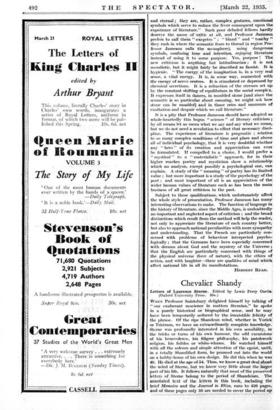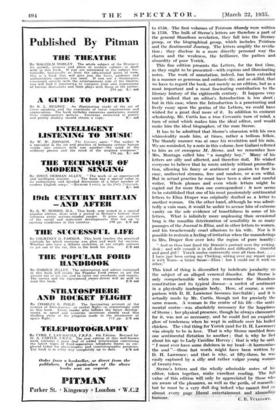Chevalier Shandy
Letters of Laurence Sterne. Edited by Lewis Perry Curtis.' (Oxford University Press. 30s.) Letters of Laurence Sterne. Edited by Lewis Perry Curtis.' (Oxford University Press. 30s.)
WHEN Professor Saintsbury delighted himself by talking of " our exuberant neseience in matters Sternian," he spoke in a purely historical or biographical sense, and he may have been temporarily seduced by the irresistible felicity of the phrase. Of the ripe Shandean mind, -whether in Yorick or Tristram, we have an extraordinarily complete knowledge. Sterne was profoundly interested in his own sensibility, in the tricks or turns of his own humour, the odd excursions of his benevolence, his filigree philosophy, his patchwork religion, his foibles or whim-whams. He watched himself with all the solemn and simple attention of the egoist, until, in a totally Shandifled form, he pranced out into the world on a hobby-horse of his own design. He did this when he was 46. He died at the age of 54. Thus, we know a great deal about the mind of Sterne, but we know very little about the larger part of his life. It follows naturally that most of the preserved letters of Sterne belong to the period of Shandeism. The annotated text of the letters in this book, including the brief 'Memoirs and the Journal to Eliza, runs to 420 pages, and of these pages only 50 are needed to cover the period up to 4758.-- The first-volumes of Tristram Shandy were written
in 1759. The bulk of Sterne's letters are therefore a part of the general Shandean revelation, they fall into the literary
group, or the biographical group, which includes Tristram and the Sentimental Journey. The letters amplify the revela-
tion ; they disclose in a more directly personal way the charm and the weakness, the brilliance, the pathos and absurdity of poor Yorick.
This fine edition presents the Letters, for the first time, as they ought to be presented—with copious and illuminating notes. The work of annotation, indeed, has been extended in a manner so generous and enthusir ftic, and so skilful, that we have to regard the book, not merely as an edition, but as a most important and a most fascinating contribution to the literary history of the eighteenth century. It happens very rarely indeed that an editor's Introduction is too short ; but in this case, where the Introduction is a penetrating and lively essay upon the genius of the Letters, we could have
wished for a great deal more of it. In addition to eminent scholarship, Mr. Curtis has a true Cervantic turn of mind, a turn of mind which makes him the ideal editor, and would make him the ideal biographer, of the man Sterne.
It has to be admitted that Sterne's obsession with his own whimsicality made him, at times, rather a tedious fellow.
The Shandy manner was at once his revelation and his ruin. We are reminded, by a note in this volume, how Galiani referred to him as eel ennuyeux M. Sterne, and we remember how Mrs. Montagu called him " a naughty boy." Many of his letters are silly and affected, and therefore dull. He wished everyone to believe that he wrote entirely without premedita- tion, allowing his fancy or sentiment or passion to flow in easy, undirected streams, free and random, or e ven wilful. But in actual practice he must have been a slow and careful writer. Whole phrases and even whole letters might be copied out for more than one correspondent : it now seems to be established that one of his most passionately sentimental letters to Eliza Draper was originally drafted as a letter to another woman. On the other hand, although he was admit- tedly a vain man, it would be unfair to accuse him of extreme vanity on the sole evidence of boastfulness in some of his letters. What is infinitely more unpleasing than occasional brag is the maudlin deterioration of sensibility in so many passages of the Journal to Eliza, and in other letters to women, and his treacherously cruel allusions to his wife. Nor is it possible to restrain a feeling of irritation when the maunderings to Mrs. Draper flow over into the region of pure inanity : " And so thou hest fixed thy Bramin's portrait over thy writing- desk ; and wilt consult it in all doubts and difficulties. Grateful and good girl ! Yorick smiles contentedly over all thou dost. . . . I have just been eating my Chicking, sitting over my repast upon it with Tears—a bitter Sause—Eliza ! but I could eat it with no other."
This kind of thing is diversified by indelicate jocularity on the subject of an alleged venereal disorder. But Sterne is only comprehensible when you remember the Shandean constitution and its typical disease—a surfeit of sentiment in a physically inadequate body. Here, of course, a com- parison With D. H. Lawrence hecomes inevitable ; and it is actually made by Mr. Curtis, though not for precisely the same reason. A woman in the centre of his life—the senti- mental centre—was absolutely necessary for the happiness of Sterne ; her physical presence, though he always clamoured for it, was not so necessary, and he could feel, an exquisite glow of tenderness when he wept in solitude over his boiled chicken. The vital thing for Yorick (and for D. H. Lawrence) was simply to be in love. That is why Sterne rambled from one sentimental flirtation to another ; that is why he lied about his age to Lady Caroline Hervey ; that is why he said, "I must ever have some dulcinea in my head—it harmonizes the soul "—those last words might have been written by D. H. Lawrence ; and that is why, at fifty-three, he was easily captured by a silly and rather vulgar young woman of twenty-two.
:Sterne's letters and the wholly admirable notes of his editor, taken together, make -excellent reading. The full value of this edition will only be appreciated 6y those who are aware of the pleasures, as well as the perils, of research.: but he must be a very dull dog indeed who cannot find op almost, every page liberal entertainment and aboutidiny humour.-
C. E. Vt.a.m.tmr.





























































 Previous page
Previous page